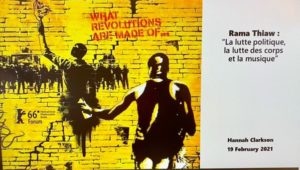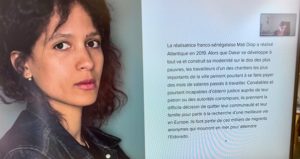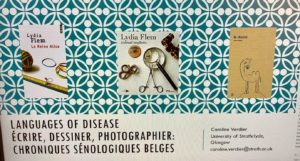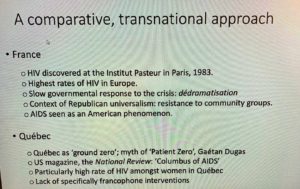Steven Wilson reports on the conference Languages of Disease in the Contemporary Francophone World, held on 19 February 2021
Building on recent studies into the language used to represent disease in modern metropolitan France, Languages of Disease in the Contemporary Francophone World, supported by the IMLR’s Regional Conference Grant Scheme, aimed to widen the scope of enquiry into the geographical zones, cultural and political contexts of the broader francosphère. This is a community of countries and regions where many of the world’s recent pandemics, including Ebola, HIV/AIDS and cholera, have had devastating effects. The event was originally scheduled to take place at the University of Stirling in February 2021 but (and with inescapable irony) the coronavirus pandemic forced us to move it online. Hosting the workshop on Zoom nonetheless allowed almost forty delegates from across the world to join the discussion, while the backdrop of Covid-19 reminded us of the important role that modern languages have to play in representing and making sense of disease, one of the major global challenges of our time.
Taking account of current restrictions, the project organisers, Dr Hannah Grayson (University of Stirling) and Dr Steven Wilson (Queen’s University Belfast), decided to re-shape the event into a multifarious digital project comprising connected elements. An initial structured interview with Dr Charlotte Baker (Lancaster University), published on the IMLR website, was used to set out some of the context and key questions for participants to engage with. In the interview, Dr Baker gave details of the scope and impact of her work as Principal Investigator of the AHRC project ‘Alternative Explanations: Disability in African Contexts’. At the ensuing workshop, seven speakers, from the UK, France, Sweden, Finland and the USA, gave presentations, in French or English, following an opening keynote talk by Dr Éloïse Brezault (St. Lawrence University, New York State), entitled ‘Fantômes, intrus et épidémie dans Atlantique de Mati Diop ou comment repenser la crise migratoire à travers la maladie’. Dr Brezault’s keynote outlined many of the conceptual parameters of the project via an analysis of Diop’s critically acclaimed film.
The workshop was structured to allow for maximum discussion. Key areas to emerge included: the politics of epidemics across the francosphère; how the gender politics of francophone countries inflect the language used to describe disease; how disease is associated with practices and behaviours that mark cultural difference; and the duty of society when faced with disease. Presentations and discussion focused notably on what francophone literature, film, music, graphic art and testimony reveal about the role of language, genre and form in giving expression to diverse (including non-Western) experiences of disease. In a context where the global response to the coronavirus pandemic has been coordinated by the World Health Organisation, research presented at the workshop underscored the political, ethical and healthcare imperatives of avoiding approaches to disease characterised by universalism. Dr Baker, in the final section of the event, responded to the presentations and discussion, focusing on the crucial question of voice in representations of disease; she reminded us that, by paying attention to a multiplicity of voices – particularly from underrepresented groups – not only do we bring to the fore new languages of disease, but our research can play an important role in addressing health inequalities.
used to describe disease; how disease is associated with practices and behaviours that mark cultural difference; and the duty of society when faced with disease. Presentations and discussion focused notably on what francophone literature, film, music, graphic art and testimony reveal about the role of language, genre and form in giving expression to diverse (including non-Western) experiences of disease. In a context where the global response to the coronavirus pandemic has been coordinated by the World Health Organisation, research presented at the workshop underscored the political, ethical and healthcare imperatives of avoiding approaches to disease characterised by universalism. Dr Baker, in the final section of the event, responded to the presentations and discussion, focusing on the crucial question of voice in representations of disease; she reminded us that, by paying attention to a multiplicity of voices – particularly from underrepresented groups – not only do we bring to the fore new languages of disease, but our research can play an important role in addressing health inequalities.
We look forward to developing our reflections into a publication in the near future. In the meantime, the organisers would like to thank all participants for their contribution to the event, and express particular gratitude to Cathy Collins at the IMLR for her organisational support.
Dr Steven Wilson, Senior Lecturer in French Studies, Queen’s University Belfast



